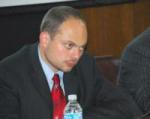11 September 2014
Vladimir Kara Murza
MOSCOW — On September 14th, dozens of Russian regions, including Moscow and St. Petersburg, will hold elections on different levels, from municipal councilors to regional legislators and governors. Supporters of Vladimir Putin and his United Russia party will score landslide victories across the country. This will not be because, as the Kremlin propaganda claims, the regime has widespread popular support—but because all contenders that could pose even potential danger to pro-Kremlin candidates have been removed from the ballot in advance.
Article: http://www.worldaffairsjournal...St. Petersburg, often described as Russia’s most opposition-minded city, where Putin’s party only managed 35.4 percent in the 2011 parliamentary election; where pro-democracy forces have a significant presence in the legislature; and where 12 of the 50 lawmakers refused to back the war in Ukraine, is perhaps the best example of Putin-style “elections.” The authorities invented new creative ways of keeping the vote opposition-free. Some electoral commissions were simply closed, leaving municipal council candidates unable to file nomination papers. Others physically barred opposition contenders from entering their buildings. Others still had artificial long lines of bogus “candidates” that kept genuine contenders waiting until the time ran out. As a result, the pro-democracy Yabloko, Civic Platform, and People’s Freedom Party had half of their municipal candidates disqualified. Meanwhile, the St. Petersburg gubernatorial election will feature a “contest” between the Kremlin-installed incumbent, former KGB officer Georgy Poltavchenko, and four little-known shadow boxers. The leading opposition candidate, social democratic State Duma member Oksana Dmitrieva, who, according to the polls, was likely to deny Poltavchenko an outright victory and take the election into an unpredictable runoff, was denied access to the ballot.
In fact, several prominent gubernatorial candidates were prevented from running by the so-called “municipal filter” introduced by the Kremlin in 2012—the requirement that a candidate collect a certain number of signatures from municipal council members, the vast majority of whom are loyal to the authorities. Even when opposition candidates managed the impossible and collected the signatures, some of these were promptly ruled “invalid,” as happened to, among others, the liberal deputy mayor Ivan Starikov in Novosibirsk and the leftist former vice president Alexander Rutskoi in Kursk.
In Pskov, the main opposition gubernatorial contender was Lev Shlosberg, a member of the regional parliament and the local leader of Yabloko party. He is a longtime thorn in the Kremlin’s side, exposing corruption, leading the fight against the anti-orphan law, and harshly criticizing Putin’s war on Ukraine. He fell just 8 short of the required 157 municipal signatures after tremendous pressure was put on local legislators from United Russia and the governor’s office. The incumbent, Andrei Turchak, called Shlosberg a “traitor” for opposing the war. Even after being shut off from the election, Shlosberg continued the fight: It was his newspaper that, in late August, for the first time confirmed the presence of regular Russian troops in Ukraine, exposing Putin’s lie about a “civil conflict.” On August 29th, Shlosberg was brutally beaten by unidentified assailants near his home. He is now in hospital, recovering from a severe head injury and partial memory loss.
In Moscow, the draconian signature requirement—introduced by the authorities earlier this year, just in time for the City Duma election—has kept almost all independent opposition candidates from the ballot. The few who managed to reach the finish line thanks to nominations by Yabloko (a party that received more than 3 percent of the national vote in 2011 and is thus exempt from collecting signatures) are now facing a heavy-handed intimidation campaign from the authorities. The result will be that the city where tens of thousands of people went to the streets to protest Putin’s rule in 2011–2012, and where some 30 percent voted for opposition leader Alexei Navalny in the mayoral election just a year ago, will have a rubber-stamp legislature.
This Sunday, Putin’s United Russia will claim yet another pyrrhic “election victory.” The obvious question—not so much to the Kremlin as to its public apologists, including those in the West: Would a genuinely popular government be so terrified of competition that it leaves the Russian people no choice at the ballot box?
More about:
Europe and Central Asia,
Russia,
Vladimir Putin
Vladimir Kara-Murza's blog

